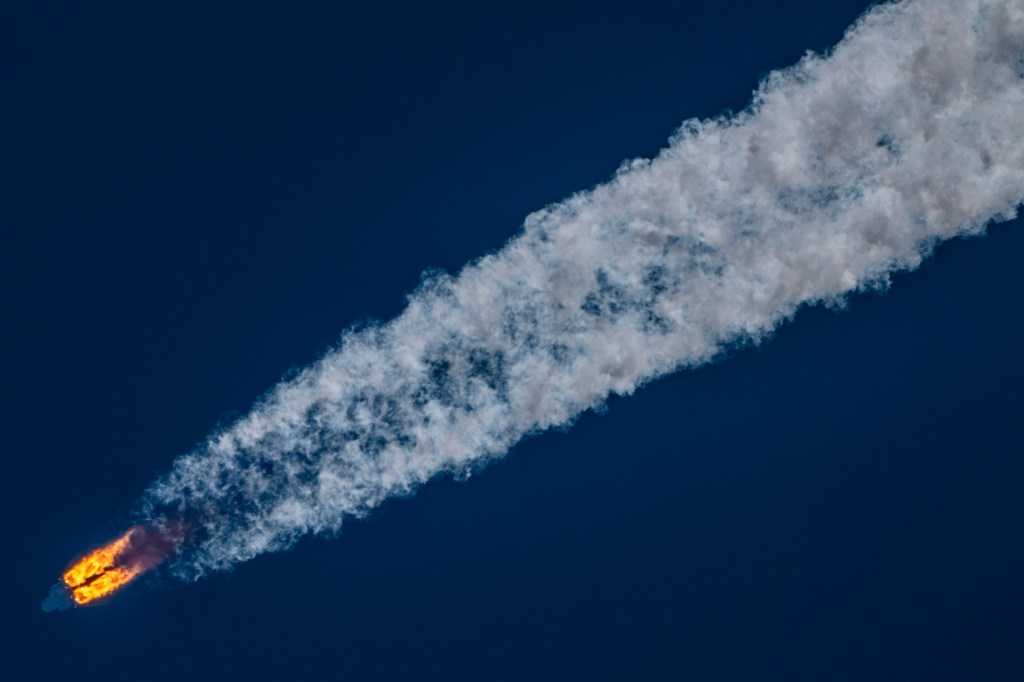Fragments of a gigantic Chinese rocket are expected to fall to Earth this weekend during an uncontrolled reentry from space, potentially exposing people to dangerous falling debris, though the risk of anybody getting hurt is low.
The rocket parts will impact Earth at a location with a latitude between New York City in the north end and New Zealand in the south, on Saturday, July 30, at 7:24 p.m. UTC time (3:24 p.m. EST) according to the Aerospace Corporation, which has been tracking the debris. The measurement has an error margin of plus or minus seven hours.
Videos by VICE
China launched its most powerful rocket, the Long March 5B rocket, for the third time last Sunday to support the ongoing construction of the nation’s Tiangong space station. The rocket, which is 176-feet-tall, delivered a laboratory module called Wentian to a crew of astronauts who are assembling Tiangong in orbit.
One of the rocket’s massive boosters, weighing 22 tons, is designed to enter orbit with the module. Normally, spent boosters fall back to Earth in a controlled fashion with predictable landing spots in unpopulated areas.
But China has allowed rocket parts to fall uncontrolled back to Earth during all three of its Long March 5B missions. After the vehicle’s maiden flight in 2020, debris from the launch may have fallen on communities in Côte d’Ivoire, while in 2021, the booster parts fell into the Indian Ocean. Though the booster and other launch remnants disintegrate into smaller parts during reentry, enough debris will survive to drop metal shards over an area of 1,240 miles, according to Reuters.
Most uncontrolled space debris falls harmlessly in unpopulated areas, but some have caused concern in the past. For instance, the Soviet Kosmos 954 satellite littered radioactive waste over northern Canada during an uncontrolled crash in 1978, and parts of a SpaceX booster fell in rural Washington last year.
“We want to reiterate to the public that while the risks facing any specific individual are very, very low for this reentry, they are nonzero, and that’s why it’s important for us to track this object and share our information when it becomes available,” said Marlon Sorge, technical fellow and director, Center for Orbital and Reentry Debris Studies at The Aerospace Corporation, in an emailed statement to Motherboard.
“The risk to any specific individual—so you, or me, or your neighbor or friend—from reentry debris in any given year is 1 per 100 billion,” he continued. “The risk of getting hit by lightning is 80,000 times greater. For this particular reentry, the risk to any specific person is 6 per 10 trillion. Nearly 1 billion people on earth—12 percent of the total population—have zero risk.”
“That said, again, the risk is nonzero for a casualty related to this reentry: between 1 in 1,000 and 1 in 230,” he added. “That is at minimum ten times riskier than the accepted threshold of 1 in 10,000, based on U.S. policy. An important distinction to make here is that a casualty is not a fatality. Regarding reentry events, the term ‘casualty’ is very specific to mean any injuries suffered by people on the ground due to falling debris. It does not mean only deaths.”
The risks associated with space debris were also investigated in a recent Nature Astronomy study that predicted there is a 10 percent chance a person will be killed by falling spacecraft parts this decade.
“One could imagine someone in a mega city in the Global South or in a rural area in a developing country being mysteriously killed by a small piece of metal falling from the sky,” Michael Byers, a professor in the University of British Columbia’s department of political science who co-authored the study, told Motherboard.
“Is that going to be reported as a piece of rocket body?” he said. “Will the global media find out about that development? I mean, the point here is that we’re talking about an absence of reported deaths.”
More
From VICE
-

Final Fantasy Tactics -

Paul Natkin/WireImage) -

(Photo by Julia Beverly/Getty Images)


